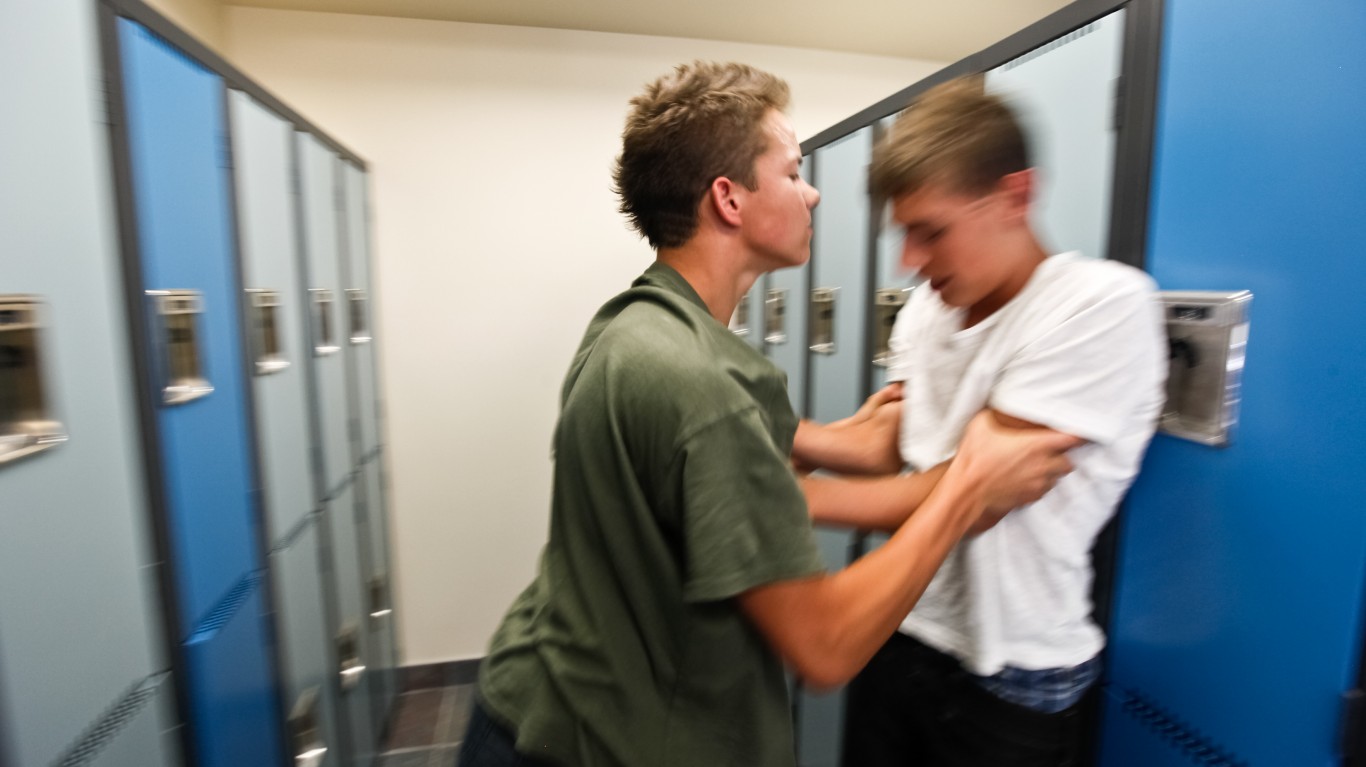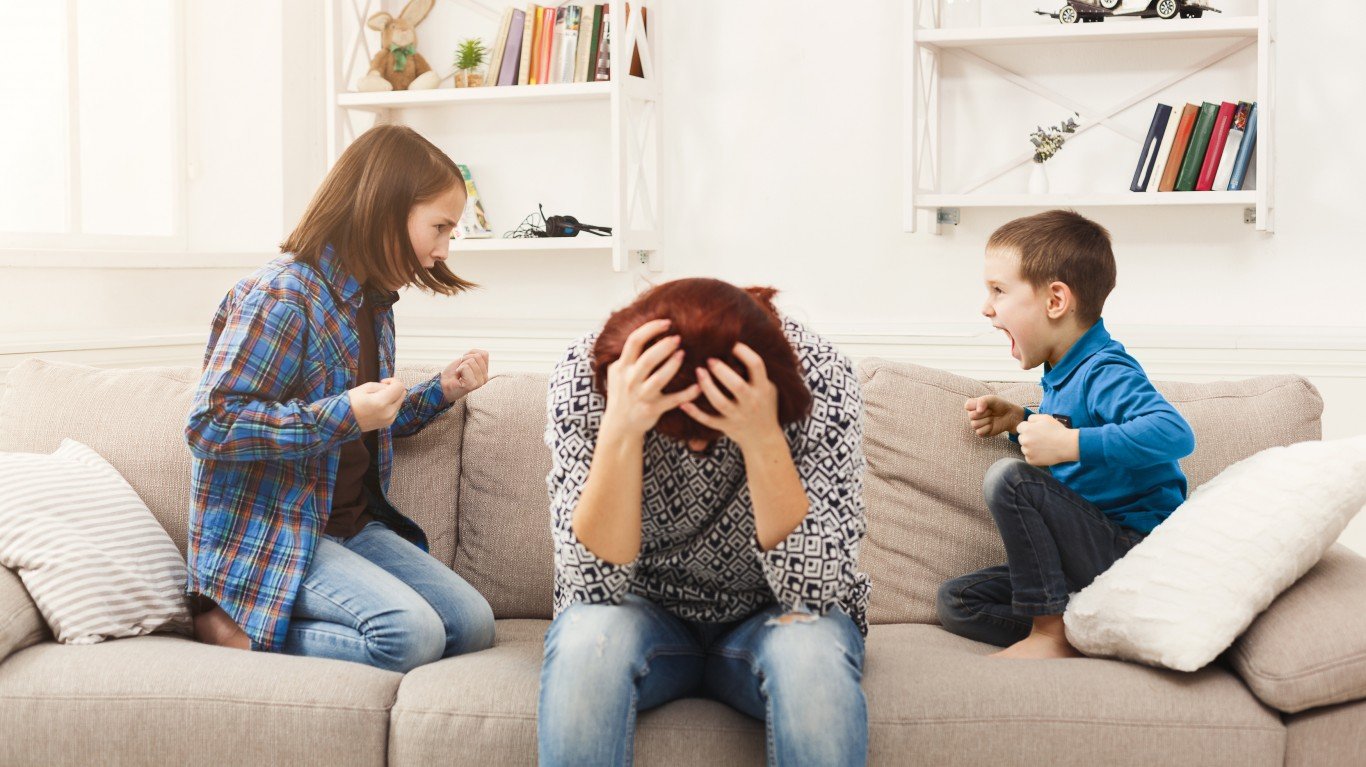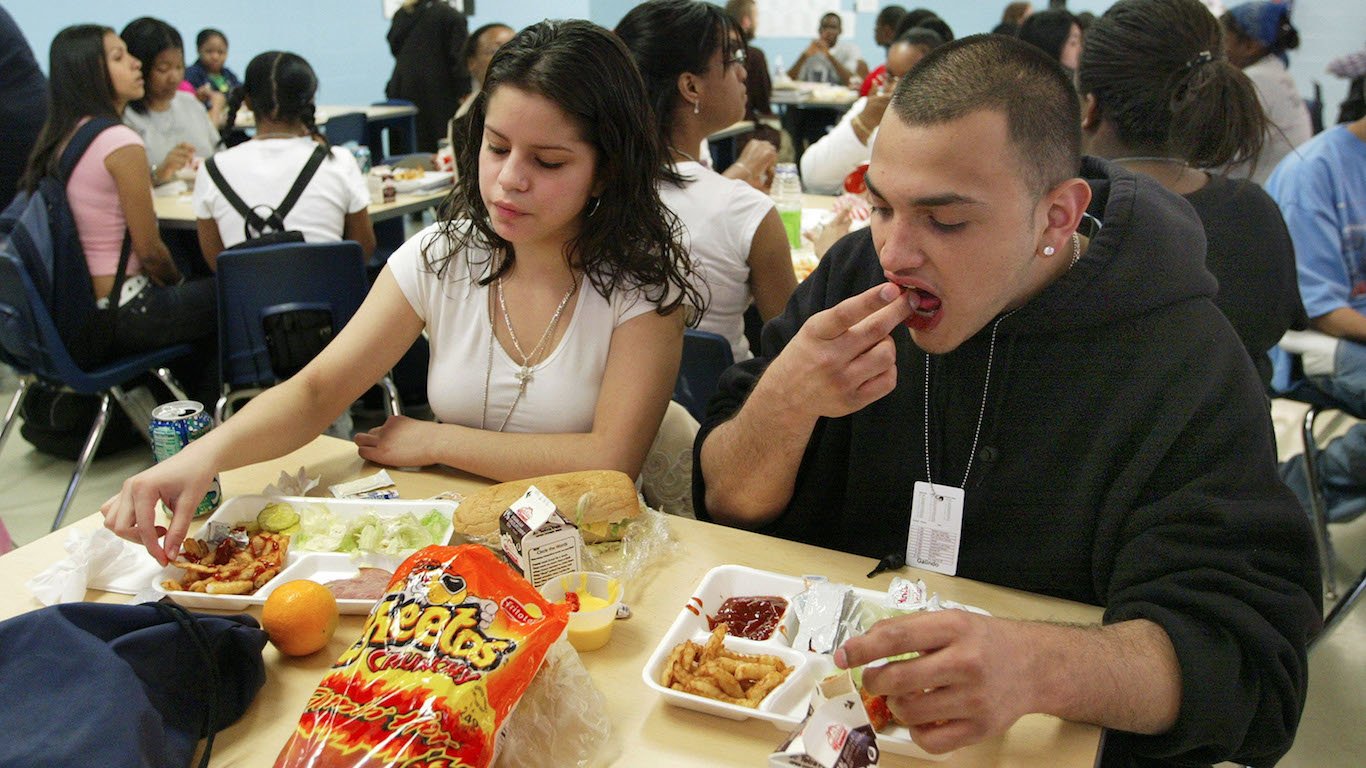What Not to Say When Your Child Is Being Bullied (or Bullying Others)
October 14, 2019 by Steven M. PetersA fifth of all students between 12 and 18 years of age in the country have been bullied, according to the National Center for Education Statistics and Bureau of Justice, though up to one-third of students claim to have been bullied. Whether bullying is on the rise is hard to determine, Julie Hertzog, director of PACER’s National Bullying Prevention Center explained in an interview. “Awareness has risen and that may account for more cases being reported.”
24/7 Tempo consulted several experts specializing in bullying prevention and reviewed information from both government and nonprofit anti-bullying and cyberbullying organizations, such as StopBullying.gov and StompOutBullying.org to find out what things never to say to your child if they are being bullied. These are the 20 warning signs your child may be getting bullied at school.
Physical and cyber bullying often occur together, Hertzog said. “If a child is being bullied face to face, it’s likely happening online as well,” she added. Parents and teachers need to form a partnership and work together to detect any sign of abusive behavior as early as possible, Hertzog noted.
There is no federal law directly addressing bullying, but in some cases it can overlap with laws against harassment based on race, country of origin, disability, or religion. Some states have established anti-bullying laws or other regulations to address the problem. Most of these require that schools investigate when bullying is reported and respond accordingly.
The prevalence of bullying varies heavily throughout the United States and may be correlated with factors such as child obesity, poverty, and mental stress — these are the states where bullying is the biggest problem.
Click here to learn about what not to say when your child is being bullied (or bullying others).

I’m going to take your cell phone away
We’ve all heard of instances of cyberbullying, and separating a kid from electronic devices may seem like a surefire way to put an end to it. But to the youngster, it’s bound to feel like a blame-the-victim situation. Restricting access to phones or laptops will be interpreted as punishment and likely guarantee that they’ll be leery about sharing similar concerns in the future.
[in-text-ad]

Let’s get you two together and sort this out
Getting the bully and the bullied child together in the company of their parents is unlikely to make a positive and lasting difference. In fact, if the get-together misfires badly, the child may lose confidence in her or his folks’ ability to help. The target may be frightened and ill at ease having to confront the bully, and while the two may put on their best behavior as long as the grownups are around, they’ll likely revert to the uncomfortable norm once they’re back in the schoolyard.

Just ignore it
Telling a kid to ignore a bully has been knee-jerk response from parents for a long time. But chances are the child has already tried ignoring the bully and it didn’t put an end to the situation. Even worse, a grownup’s offhand acceptance of the ugly behavior may convince the child that the bully’s belittling remarks are accurate and they deserve the abuse.

Just play video games until suspension is over
Experts on bullying recommend that the punishment that school metes out for kids who are bullies should be reflected in disciplinary action the parents take at home. If a child is suspended for bullying, he or she should not be allowed to stay online or play video games all day until the suspension has been served.
[in-text-ad-2]

You need to get tough
Kids are often urged to be tough and tolerate whatever the playground miscreant is handing out. If you think about it, the bullied child showed backbone by coming forward, since blowing the whistle on a wrongdoer is a pretty tough thing to do. Also, tamping down complex emotions can lead to anxiety and depression, which can persist long beyond the schoolyard years. For many boys routinely ignoring and denying their feelingsâat parental urging — can be a recipe for future toxic masculinity.

Maybe you should change
Encouraging children to alter their personalities, appearance, beliefs, or other characteristics to avoid bullying is a nonstarter. This sends the message that the bully is right and there’s something wrong with the kid on the receiving end of the negative attention. The only thing that needs to change is the bully’s abusive behavior.
[in-text-ad]

Just deal with it yourself
If children could deal with bullies on their own, chances are they would have done so already. It’s likely they tried without success. That’s when they turn to their parents for input and protection. Let them know you have their back.

Don’t take it, fight back
Bullies often size up their targets, literally. They’re unlikely to pick on anyone if there’s a chance of not coming out on top. Do you really want to send the message that violence is the way to solve uncomfortable situations?

What did you do to cause this?
Asking a child what he or she did to provoke bullying is an age-old blame-the-victim response. You’re pretty much saying that the kid caused the abuse they received — and if so, they deserve it. Actually, the bully is responsible for his or her actions and for making the decision to behave in ways hurtful to others.
[in-text-ad-2]

It must be because of something the other kid did
Parents need to hold their child accountable for his or her actions. Bullies are skilled at skewing the accounts of the incident in their favor. If their child tells them he or she was provoked, rather than deflecting responsibility, parents should ask if it’s possible parts of the other version of the incident are true. This allows parents to get a more complete picture of the incident and teaches the child to see things from another vantage point.

You’re being a drama queen
It’s difficult for children to confide in their parents that a bully is targeting them. Having a parent or caretaker automatically assume the kid is exaggerating or embellishing is practically a guarantee that the openness won’t be repeated. Girls, in particular, are likely to have encounters with bullies dismissed and to be stuck with the “drama queen” label. Many are afraid to come forward, for fear of not being believed or being viewed as weak.
[in-text-ad]

Why didn’t you stand up for yourself?
Bullies and victims are rarely evenly matched. The difference could be size, age, social status, athletic prowess, or any number of other factors. Bullies won’t home in on a target unless they’re sure of coming out ahead. Looking for a solution is a more constructive path for the parent and child to take together rather than making the youngster believe he or she did something wrong.

Get over it
“Get over it” is easier said than done. People can recall being the focus of negative treatment decades after an incident takes place. Discounting the hurt feelings or physical injury can impact a child’s self-esteem and lead to anxiety, depression, or even suicidal thoughts.

As the parent, I’ll handle this
As tempting as it might be for a parent to confront the bully, it won’t solve the problem and may even make things worse. Stay calm, talk with your child, review options for handling the situation and the likely outcomes of different approaches.
[in-text-ad-2]

Let me call the parents
It’s natural to go into protective mode if your child describes mean or hurtful behavior, but calling the bully’s parents isn’t necessarily the best immediate strategy. Talk with your child and see if they have ideas on how to handle the conflict in a way that helps them feel safe, satisfied, and listened to. If the bullying continues or escalates, if you know the parents, you might consider getting in touch. But if you have no prior contact, ask a teacher or school official to help out.

Get fighting out of your system
Kids often quarrel with their siblings at home, and sometimes parents will dismiss violent behavior outside the home as an extension of that behavior. At home, parents should know when to intervene when the disagreement deteriorates into a physical altercation. They need to know when to step in and educate their child on what is acceptable and what is not acceptable behavior also outside the home, especially when a confrontation escalates with someone outside the family.
[in-text-ad]

You don’t have to go to school today
It’s overly optimistic to imagine that keeping a child home from school for a single day is going to result in a permanent end to a pattern of bullying. A more lasting solution would involve pinpointing the problem and working out strategies with your little one.

Stand up for yourself
Advising children to stand up for themselves when dealing with bullies imbues them with more power than they actually have. The child likely doesn’t have a clue as to how to resolve an encounter simply by asserting his or herself. Plus, bullies often travel with an entourage and single out kids who are on their own, which is even more overwhelming.

Don’t tell anyone
There’s no reason to keep bullying a secret. Whether your child is being ghosted by an ex-best friends or the target of physical or verbal abuse, he or she has nothing to be ashamed of. Working out a buddy system with a classmate, or updating a teacher or school counselor about the situation and asking for guidance is a better path than pretending there’s nothing going on.
Sponsored: Want to Retire Early? Here’s a Great First Step
Want retirement to come a few years earlier than you’d planned? Or are you ready to retire now, but want an extra set of eyes on your finances?
Now you can speak with up to 3 financial experts in your area for FREE. By simply clicking here you can begin to match with financial professionals who can help you build your plan to retire early. And the best part? The first conversation with them is free.
Click here to match with up to 3 financial pros who would be excited to help you make financial decisions.
 24/7 Wall St.
24/7 Wall St. 24/7 Wall St.
24/7 Wall St. 24/7 Wall St.
24/7 Wall St. 24/7 Wall St.
24/7 Wall St.